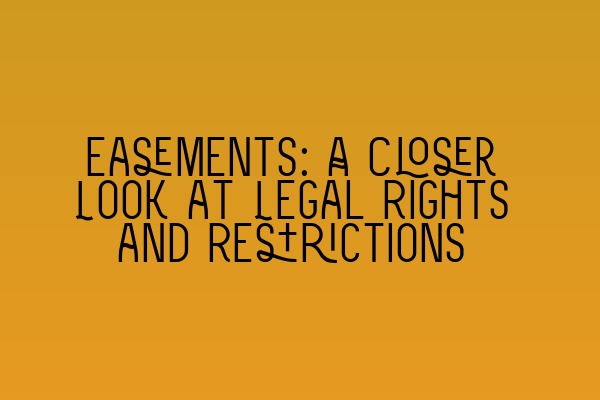Easements: A Closer Look at Legal Rights and Restrictions
Introduction
When it comes to property law, one concept that often arises is easements. Easements are legal rights and restrictions that pertain to the use and enjoyment of land. They can have a significant impact on property owners, and it is essential to understand their nature, scope, and implications. In this blog post, we will take a closer look at easements, exploring their definition, types, creation, and termination.
Definition of Easements
An easement is a legal right that grants a person or entity the privilege to use another person’s land for a specific purpose. This right, which is attached to the land and not the individual, allows the holder of the easement to enjoy certain benefits or restrict the use of the land in some manner. Easements can be both affirmative, allowing the holder to use the land for a specific purpose, or negative, restricting the owner’s use of the land in some way.
Types of Easements
There are several types of easements that property owners should be aware of:
1. Right of Way – A right of way easement grants someone the right to pass through another person’s land to access a specific location. This type of easement is commonly seen in situations where a landlocked property needs access to a public road.
2. Utility Easements – Utility companies often hold easements that allow them to access private property to install and maintain utility lines. These easements are created to ensure the continuous provision of essential services.
3. Drainage Easements – Drainage easements give a property owner the right to direct water flow across another person’s property, ensuring proper drainage and preventing flooding.
4. Conservation Easements – Conservation easements are designed to protect natural resources and wildlife habitats. They restrict certain activities on the land, such as development or logging, to preserve the environment.
Creating Easements
Easements can be created in several ways, including:
1. Express Grant – An easement can be created through an express grant, which involves the landowner granting the easement to another party through a written agreement or deed.
2. Reservation – A landowner may reserve an easement when transferring ownership of the property to someone else. This reservation ensures that the original landowner retains certain rights over the land even after the transfer.
3. Prescription – In some cases, an easement can be acquired through adverse possession or continuous use of the land for a specific period. This is known as an easement by prescription.
Terminating Easements
Easements can be terminated in several ways, including:
1. Merger – If the dominant and servient estate come under the ownership of the same person, the easement is said to merge, and it ceases to exist.
2. Release – The holder of the easement can release their rights voluntarily through a written agreement with the landowner.
3. Abandonment – An easement can be deemed abandoned if the easement holder demonstrates an intent to give up their rights and stops using the easement.
4. Prescription – If the servient estate owner disrupts the continuous use of the easement by the easement holder for a specified period, the easement can be extinguished through prescription.
Conclusion
Easements play a crucial role in property law, granting individuals or entities certain rights or restrictions concerning the use and enjoyment of land. Whether you need to understand the implications of an easement on your property or are involved in creating or terminating an easement, it is critical to seek professional advice to navigate these legal matters successfully.
At SQE Property Law & Land Law, our team of solicitors specializes in property and land-related legal issues. From advising on easements to assisting with other property law matters, we provide comprehensive legal services tailored to our clients’ needs. Contact us today to discuss your property law requirements.
Related Articles:
– Misrepresentation in Contracts: Unveiling Deceptive Practices
– A Closer Look at SQE Contract Law Syllabus
– SQE Contract Law: Analyzing Landmark Cases and Influential Judicial Decisions
– Understanding Contractual Capacity: Rights and Limitations
– Interactive SQE Mock Tests for Contract Law: Test Your Knowledge
